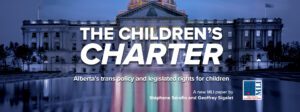Uncategorized
Weaponizing human rights tribunals

From the Macdonald Laurier Institute
By Stéphane Sérafin for Inside Policy
If adopted, Bill C-63 could unleash a wave of “hate speech” complaints that persecute – and prosecute – citizens, businesses, or organizations while stifling online expression.
Much has already been written on Bill C-63, the Trudeau government’s controversial Bill proposing among other things to give the Canadian Human Rights Tribunal jurisdiction to adjudicate “hate speech” complaints arising from comments made on social media. As opponents have noted, the introduction of these new measures presents a significant risk to free expression on many issues that ought to be open to robust public debate.
Proponents, for their part, have tended to downplay these concerns by pointing to the congruence between these new proposed measures and the existing prohibition contained in the Criminal Code. In their view, the fact that the definition of “hate speech” provided by Bill C-63 is identical to that already found in the Criminal Code means that these proposed measures hardly justify the concerns expressed.
This response to critics of Bill C-63 largely misses the point. Certainly, the existing Criminal Code prohibitions on “hate speech” have and continue to raise difficult issues from the standpoint of free expression. However, the real problem with Bill C-63 is not that it adopts the Criminal Code definition, but that it grants the jurisdiction to adjudicate complaints arising under this definition to the Canadian Human Rights Tribunal.
Established in 1977, the Canadian Human Rights Tribunal is a federal administrative tribunal based on a model first implemented in Ontario in 1962 and since copied in every other Canadian province and territory. There is a Canadian Human Rights Tribunal, just as there is an Ontario Human Rights Tribunal and a British Columbia Human Rights Tribunal, among others. Although these are separate institutions with different jurisdictions, their decisions proceed from similar starting points embedded in nearly identical legislation. In the case of the Canadian Human Rights Tribunal, that legislation is the Canadian Human Rights Act.
Tribunals such as the Canadian Human Rights Tribunal are administrative bodies, not courts. They are part of the executive branch, alongside the prime minister, Cabinet, and the public service. This has at least three implications for the way the Tribunal is likely to approach the “hate speech” measures that Bill C-63 contemplates. Each of these presents significant risks for freedom of expression that do not arise, or do not arise to the same extent, under the existing Criminal Code provisions.
The first implication is procedural. As an administrative body, the Tribunal is not subject to the same stringent requirements for the presentation of evidence that are used before proper courts, and certainly not subject to the evidentiary standard applied in the criminal law context. But more importantly still, the structure of the Canadian Human Rights Act is one that contemplates a form of hybrid public-private prosecution, in which the decision to bring a complaint falls to a given individual, while its prosecution is taken up by another administrative body, called the Human Rights Commission.
This model differs from both the criminal law context, where both the decision to file charges and prosecute them rest with the Crown, and from the civil litigation context, where the plaintiff decides to bring a claim but must personally bear the cost and effort of doing so. With respect to complaints brought before the Tribunal, it is the complainant who chooses to file a complaint, and the Human Rights Commission that then takes up the burden of proof and the costs of prosecution.
In the context of the existing complaints process, which deals mainly with discriminatory practices in employment and the provision of services, this model is intended to alleviate burdens that might deter individuals from bringing otherwise valid discrimination complaints before the Tribunal. Whatever the actual merits of this approach, however, it presents a very real risk of being weaponized under Bill C-63. Notably, the fact that complainants are not expected to prosecute their own complaints means that there is little to discourage individuals (or activist groups acting through individuals) from filing “hate speech” complaints against anyone expressing opinions with which they disagree.
This feature alone is likely to create a significant chilling effect on online expression. Whether a complaint is ultimately substantiated or not, the model under which the Tribunal operates dispenses complainants from the burden of prosecution but does not dispense defendants from the burden of defending themselves against the complaint in question. Again, this approach may or may not be sensible under existing anti-discrimination measures, which are primarily aimed at businesses with generally greater means. But it becomes obviously one-sided in relation to the “hate speech” measures contemplated by Bill C-63, which instead target anyone engaging in public commentary using online platforms. Anyone who provides public commentary, no matter how measured or nuanced, will thus have to risk personally bearing the cost and effort of defending against a complaint as a condition of online participation. Meanwhile, no such costs exist for those who might want to file complaints.
A second implication arising from the Tribunal’s status as an administrative body with significant implications for Bill C-63 is that its decisions attract “deference” on appeal. By this, I mean that its decisions are given a certain latitude by reviewing courts that appeal courts do not generally give to decisions from lower tribunals, including in criminal matters. “Deference” of this kind is consistent with the broad discretion that legislation confers upon administrative decision-makers such as the Tribunal. However, it also raises significant concerns in relation to Bill C-63 that its proponents have failed to properly address.
In particular, the deference granted to the Tribunal means that proponents of Bill C-63 have been wrong to argue that the congruence between its proposed definition of “hate speech” and existing provisions of the Criminal Code provides sufficient safeguards against threats to freedom of expression.
Deference means that it is possible, and indeed likely, that the Tribunal will develop an interpretation of “hate speech” that diverges significantly from that applied under the Criminal Code. Even if the language used in Bill C-63 is identical to the language found in the Criminal Code, the Tribunal possesses a wide latitude in interpreting what these provisions mean and is not bound by the interpretation that courts give to the Criminal Code. It may even develop an interpretation that is far more draconian than the Criminal Code standard, and reviewing courts are likely to accept that interpretation despite the fact that it diverges from their own.
This problem is exacerbated by the deferential approach that reviewing courts have lately taken towards the application of the Canadian Charter of Rights and Freedoms to administrative bodies such as the Tribunal. This approach contrasts to the direct application of the Charter that remains characteristic of decisions involving the Criminal Code, including its “hate speech” provisions. It also contrasts with the approach previously applied to provincial Human Rights Tribunal decisions dealing with the distribution of print publications that were found to amount to “hate speech” under provincial human rights laws. Decisions such as these have frequently been criticized for not taking sufficiently seriously the Charter right to freedom of expression. However, they at least involve a direct application of the Charter, including a requirement that the government justify any infringement of the Charter right to free expression as a reasonable limit in a “free and democratic society.”
Under the approach now favoured by Canadian courts, these same courts now extend the deference paradigm to administrative decision-makers, such as the Canadian Human Rights Tribunal, even where the Charter is potentially engaged. In practice, this means that instead of asking whether a rights infringement is justified in a “free and democratic society,” courts ask whether administrative-decision makers have properly “balanced” even explicitly enumerated Charter rights such as the right to freedom of expression against competing “Charter values” whenever a particular administrative decision is challenged.
This approach to Charter-compliance has led to a number of highly questionable decisions in which the Charter rights at issue have at best been treated as a secondary concern. Notably, it led the Supreme Court of Canada to affirm the denial of the accreditation of a new law school at a Christian university in British Columbia, on the basis that this university imposed a covenant on students requiring them to not engage in extra-marital sexual relations that was deemed discriminatory against non-heterosexual students. Four of the nine Supreme Court of Canada judges would have applied a similar approach to uphold a finding by the Quebec Human Rights Tribunal that a Quebec comedian had engaged in discriminatory conduct because of a routine in which he made jokes at the expense of a disabled child who had cultivated a public image. (With recent changes to the composition of the court, that minority would now likely be a majority). This approach to Charter-compliance only increases the likelihood that the proposed online hate speech provisions will develop in a manner that is different from, and more repressive than, the existing Criminal Code standard.
Finally, the third and potentially most consequential difference to arise from the Tribunal’s status as an administrative rather than judicial body concerns the remedies that the Tribunal can order if a particular complaint is substantiated. Notably, the monetary awards that the Tribunal can impose – currently capped at $20,000 – are often imposed on the basis of standards that are more flexible than those applicable to civil claims brought before judicial bodies. An equivalent monetary remedy is contemplated for the new online “hate speech” provisions. This remedy is in addition to the possibility, also currently contemplated by Bill C-63, of ordering a defendant to pay a non-compensatory penalty (in effect, a fine payable to the complainant, rather than the state) of up to $50,000. This last remedy especially adds to the incentives created by the Commission model for individuals (and activist groups) to file complaints wherever possible.
That said, the monetary remedies contemplated by Bill C-63 are perhaps not the most concerning remedies as far as freedom of expression is concerned. Bill C-63 also provides the Tribunal with the power to issue “an order to cease the discriminatory practice and take measures, in consultation with the Commission on the general purposes of the measures, to redress the practice or to prevent the same or a similar practice from recurring.” This remedy brings to mind the Tribunal’s existing power to under the anti-discrimination provisions of the Canadian Human Rights Act.
It is not entirely clear how this kind of directed remedy will be applied in the context of Bill C-63. The Bill provides for a number of exemptions to the application of the new “hate speech” measures, most notably to social media platforms, which may limit their scope of application to some extent. Nonetheless, it is not inconceivable that remedies might be sought against other kinds of online content distributors in an effort to have them engage in proactive censorship or otherwise set general policy with little or no democratic oversight. This possibility is certainly heightened by the way in which the existing directed remedies for anti-discrimination have been used to date.
A prominent example of directed remedies being implemented in a way that circumvents democratic oversight is provided by the Canada Research Chairs (“CRC”) program endowed by the federal government at various Canadian universities. That program has recently come under scrutiny due to the on appointments under the CRC program. In reality, those implementing the quotas are merely proceeding in accordance with a settlement agreement entered into by the federal government following a complaint made by individuals alleging discrimination in CRC appointments. That complaint was brought before the Tribunal and sought precisely the kind of redress to which the government eventually consented.
Whatever the merits of the settlement reached in the CRC case, the results achieved by the complainants through their complaint to the Tribunal were far more politically consequential than the kinds of monetary awards that have been the focus of most discussion in the Bill C-63 context. As with the one-sidedness of the procedural incentives to file complaints and the deference that courts show to Tribunal decisions, the true scope of the Tribunal’s remedial jurisdiction presents significant risks to freedom of expression that simply have no equivalent under the Criminal Code. These issues must be kept in mind when addressing the content of that Bill, which in its current form risks being weaponized by politically motivated individuals and activist groups to stifle online expression with little to no democratic oversight.
Stéphane Sérafin is a senior fellow at the Macdonald-Laurier Institute and assistant professor in the Common Law Section of the Faculty of Law at the University of Ottawa. He holds a Bachelor of Social Science, Juris Doctor, and Licentiate in Law from the University of Ottawa and completed his Master of Laws at the University of Toronto. He is a member of the Law Society of Ontario and the Barreau du Québec.
Uncategorized
Mortgaging Canada’s energy future — the hidden costs of the Carney-Smith pipeline deal


Much of the commentary on the Carney-Smith pipeline Memorandum of Understanding (MOU) has focused on the question of whether or not the proposed pipeline will ever get built.
That’s an important topic, and one that deserves to be examined — whether, as John Robson, of the indispensable Climate Discussion Nexus, predicted, “opposition from the government of British Columbia and aboriginal groups, and the skittishness of the oil industry about investing in a major project in Canada, will kill [the pipeline] dead.”
But I’m going to ask a different question: Would it even be worth building this pipeline on the terms Ottawa is forcing on Alberta? If you squint, the MOU might look like a victory on paper. Ottawa suspends the oil and gas emissions cap, proposes an exemption from the West Coast tanker ban, and lays the groundwork for the construction of one (though only one) million barrels per day pipeline to tidewater.
But in return, Alberta must agree to jack its industrial carbon tax up from $95 to $130 per tonne at a minimum, while committing to tens of billions in carbon capture, utilization, and storage (CCUS) spending, including the $16.5 billion Pathways Alliance megaproject.
Here’s the part none of the project’s boosters seem to want to mention: those concessions will make the production of Canadian hydrocarbon energy significantly more expensive.
As economist Jack Mintz has explained, the industrial carbon tax hike alone adds more than $5 USD per barrel of Canadian crude to marginal production costs — the costs that matter when companies decide whether to invest in new production. Layer on the CCUS requirements and you get another $1.20–$3 per barrel for mining projects and $3.60–$4.80 for steam-assisted operations.
While roughly 62% of the capital cost of carbon capture is to be covered by taxpayers — another problem with the agreement, I might add — the remainder is covered by the industry, and thus, eventually, consumers.
Total damage: somewhere between $6.40 and $10 US per barrel. Perhaps more.
“Ultimately,” the Fraser Institute explains, “this will widen the competitiveness gap between Alberta and many other jurisdictions, such as the United States,” that don’t hamstring their energy producers in this way. Producers in Texas and Oklahoma, not to mention Saudi Arabia, Venezuela, or Russia, aren’t paying a dime in equivalent carbon taxes or mandatory CCUS bills. They’re not so masochistic.
American refiners won’t pay a “low-carbon premium” for Canadian crude. They’ll just buy cheaper oil or ramp up their own production.
In short, a shiny new pipe is worthless if the extra cost makes barrels of our oil so expensive that no one will want them.
And that doesn’t even touch on the problem for the domestic market, where the higher production cost will be passed onto Canadian consumers in the form of higher gas and diesel prices, home heating costs, and an elevated cost of everyday goods, like groceries.
Either way, Canadians lose.
So, concludes Mintz, “The big problem for a new oil pipeline isn’t getting BC or First Nation acceptance. Rather, it’s smothering the industry’s competitiveness by layering on carbon pricing and decarbonization costs that most competing countries don’t charge.” Meanwhile, lurking underneath this whole discussion is the MOU’s ultimate Achilles’ heel: net-zero.
The MOU proudly declares that “Canada and Alberta remain committed to achieving Net-Zero greenhouse gas emissions by 2050.” As Vaclav Smil documented in a recent study of Net-Zero, global fossil-fuel use has risen 55% since the 1997 Kyoto agreement, despite trillions spent on subsidies and regulations. Fossil fuels still supply 82% of the world’s energy.
With these numbers in mind, the idea that Canada can unilaterally decarbonize its largest export industry in 25 years is delusional.
This deal doesn’t secure Canada’s energy future. It mortgages it. We are trading market access for self-inflicted costs that will shrink production, scare off capital, and cut into the profitability of any potential pipeline. Affordable energy, good jobs, and national prosperity shouldn’t require surrendering to net-zero fantasy.If Ottawa were serious about making Canada an energy superpower, it would scrap the anti-resource laws outright, kill the carbon taxes, and let our world-class oil and gas compete on merit. Instead, we’ve been handed a backroom MOU which, for the cost of one pipeline — if that! — guarantees higher costs today and smothers the industry that is the backbone of the Canadian economy.
This MOU isn’t salvation. It’s a prescription for Canadian decline.
Uncategorized
Cost of bureaucracy balloons 80 per cent in 10 years: Public Accounts

The cost of the bureaucracy increased by $6 billion last year, according to newly released numbers in Public Accounts disclosures. The Canadian Taxpayers Federation is calling on Prime Minister Mark Carney to immediately shrink the bureaucracy.
“The Public Accounts show the cost of the federal bureaucracy is out of control,” said Franco Terrazzano, CTF Federal Director. “Tinkering around the edges won’t cut it, Carney needs to take urgent action to shrink the bloated federal bureaucracy.”
The federal bureaucracy cost taxpayers $71.4 billion in 2024-25, according to the Public Accounts. The cost of the federal bureaucracy increased by $6 billion, or more than nine per cent, over the last year.
The federal bureaucracy cost taxpayers $39.6 billion in 2015-16, according to the Public Accounts. That means the cost of the federal bureaucracy increased 80 per cent over the last 10 years. The government added 99,000 extra bureaucrats between 2015-16 and 2024-25.
Half of Canadians say federal services have gotten worse since 2016, despite the massive increase in the federal bureaucracy, according to a Leger poll.
Not only has the size of the bureaucracy increased, the cost of consultants, contractors and outsourcing has increased as well. The government spent $23.1 billion on “professional and special services” last year, according to the Public Accounts. That’s an 11 per cent increase over the previous year. The government’s spending on professional and special services more than doubled since 2015-16.
“Taxpayers should not be paying way more for in-house government bureaucrats and way more for outside help,” Terrazzano said. “Mere promises to find minor savings in the federal bureaucracy won’t fix Canada’s finances.
“Taxpayers need Carney to take urgent action and significantly cut the number of bureaucrats now.”
Table: Cost of bureaucracy and professional and special services, Public Accounts
| Year | Bureaucracy | Professional and special services |
|
$71,369,677,000 |
$23,145,218,000 |
|
|
$65,326,643,000 |
$20,771,477,000 |
|
|
$56,467,851,000 |
$18,591,373,000 |
|
|
$60,676,243,000 |
$17,511,078,000 |
|
|
$52,984,272,000 |
$14,720,455,000 |
|
|
$46,349,166,000 |
$13,334,341,000 |
|
|
$46,131,628,000 |
$12,940,395,000 |
|
|
$45,262,821,000 |
$12,950,619,000 |
|
|
$38,909,594,000 |
$11,910,257,000 |
|
|
$39,616,656,000 |
$11,082,974,000 |
-

 International2 days ago
International2 days agoAustralian PM booed at Bondi vigil as crowd screams “shame!”
-

 Uncategorized2 days ago
Uncategorized2 days agoMortgaging Canada’s energy future — the hidden costs of the Carney-Smith pipeline deal
-

 Automotive1 day ago
Automotive1 day agoCanada’s EV gamble is starting to backfire
-

 Agriculture1 day ago
Agriculture1 day agoEnd Supply Management—For the Sake of Canadian Consumers
-

 Alberta1 day ago
Alberta1 day agoAlberta Next Panel calls to reform how Canada works
-

 Artificial Intelligence14 hours ago
Artificial Intelligence14 hours agoUK Police Pilot AI System to Track “Suspicious” Driver Journeys
-

 Environment23 hours ago
Environment23 hours agoCanada’s river water quality strong overall although some localized issues persist
-

 Digital ID15 hours ago
Digital ID15 hours agoCanadian government launches trial version of digital ID for certain licenses, permits












